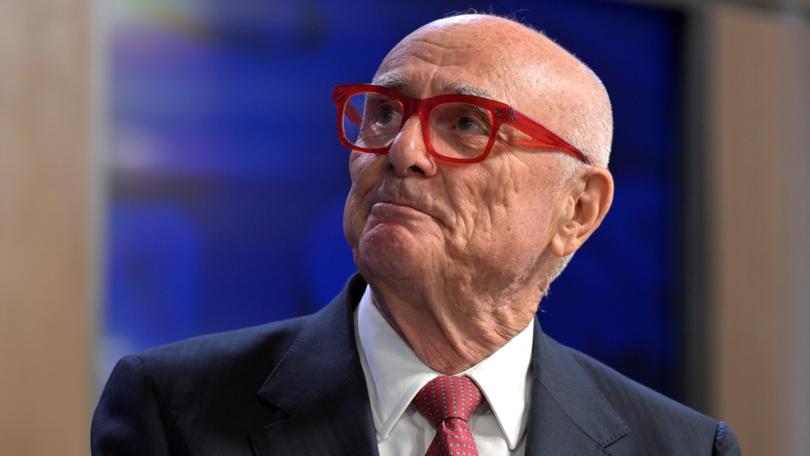Former ACCC boss Allan Fels backs beefed up grocery code of conduct as better protection for consumers

Australia’s $100 billion-plus food manufacturing industry is at risk from intense supermarket concentration, which also enables exploitation of shoppers, a Senate inquiry has been told.
Former consumer watchdog boss Allan Fels said price strategies in concentrated markets like Australia was a way consumers could be exploited, adding had the Woolworths buyout of Victorian-based, US-backed Safeway in the 1980s not proceeded, “we would have had a much more competitive retail sector”.
Professor Fels — who led the Australian Competition and Consumer Commission and its predecessor, the Trade Practices Commission from 1991 to 2003 — on Monday told the Senate inquiry into supermarket prices that the voluntary code governing grocery retailers’ dealings with suppliers is “tokenistic and very weak”.
Sign up to The Nightly's newsletters.
Get the first look at the digital newspaper, curated daily stories and breaking headlines delivered to your inbox.
By continuing you agree to our Terms and Privacy Policy.“Where everything’s voluntary ... they’ll only sign up if the conditions of code are acceptable to them,” he said. “And then, in any case, if there’s a decision under the code, they’re not bound by it.”
Professor Fels also called for further government intervention to free up the market to make it easier for new companies, adding the practice of land-banking was a major disincentive.
“The key to getting better competition in the supermarket area is to open up the barriers to entry,” he said, echoing calls from the Food and Grocery Council. Its chief executive Tanya Barden testified large multinationals were now experiencing limited control of their wholesale price.
“We have significant concerns that the retailers ultimately are becoming the gatekeepers of not only the retail price but also the wholesale price,” she said, adding that in the pre-pandemic decade, profits in food manufacturing fell from $8b to $5b and capital investment had stagnated.
Ms Barden said with many manufacturers unable to realise price over the long-term and reinvest, multinationals were considering whether to reinvest in Australia or move offshore, and domestic manufacturers faced going under.
Ms Barden said food manufacturing employed 275,000 people nationally, and 40 per cent of those jobs were in regional and rural areas. She urged the Federal Government to consider investment incentives for manufacturers as the industry shifted to greater automation, which would help keep employment strong.
“Suppliers should not be bearing the brunt of retail competition,” she said.
“At the end of the day, the retailers are responsible for their profit margins ... and they should not be putting undue pressure on suppliers to bear the weight of any price reductions.”
Professor Fels said Aldi’s impact on the sector was notable and in areas where it was present, the rivals dropped prices more than in areas where Aldi was not present. But he conceded Aldi was a different operator and was “not quite a full scale competitor”, while IGA distributor Metcash “did a good job” but tended to have higher prices.
“The more players, the harder it is to get your prices up,” he said, emphasising price control of supermarkets did not work well.
Professor Fels also backed in the establishment of divestiture laws for business, subject to court rulings, but said he generally did not support their use for supermarkets.
Any change to competition laws would only result in long-term change for consumers, not short-term change.
“The short term effect of breaking up a cartel sometimes can be considerable, but merger decisions and abuse of dominance decisions typically have a significant effect, but not an overnight effect,” he said.
Professor Fels expects changes outlined by the Food and Grocery code review last week — such as making the code mandatory, greater fines for breaches and greater emphasis on addressing a fear of suppliers by retribution — would “probably” change the behaviour of Coles and Woolworths, and quickly, “to avoid the possibility of cases being taken”.
“There are no quick easy fixes in retail, but the retailers are very concerned about their reputation, and the fact that the spotlight on them (means) more restraint in pricing behaviour in the short-term,” he said.
Ms Barden said the code should be mandatory but the retailers needed to agree to independent arbitration rather than have their own in-house dispute resolution. She said provisions needed to allow for retailers to pay reparations where necessary.
Meanwhile, Bunnings executives told the inquiry the behaviour suggested at the inquiry on Thursday about its supply and sourcing were incongruous with its usual expectations.
Greenlife category manager Belinda Rakers said its price match guarantee — or a 10 per cent price cut if a lower price is found elsewhere — applied for similar product types.
Suppliers told the hearings of being told to create unique products that were Bunnings exclusive so it could not attract the price match guarantee. Ms Rakers stated this was not the company’s practice.
Treasury officials meanwhile testified the practice of landbanking by the big supermarkets was falling away over time, while also expecting an overhaul of the country’s merger laws announced last week and to take effect from 2026 would help prevent the independent supermarkets’ pet hate of creeping acquisitions.
The new rules would require the ACCC consider acquisitions in the sector in the three years prior, and companies required to notify the watchdog of merger activity of all kinds.
